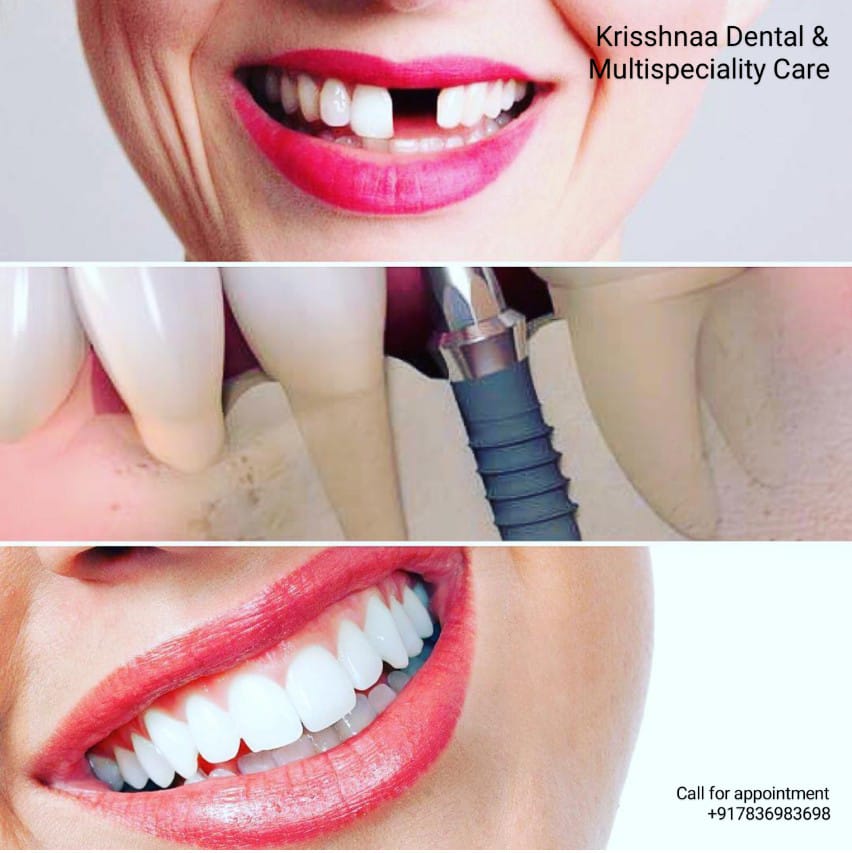
Dental bridges and dental implants are two reliable treatments to replace missing teeth.
But to immediately answer the question of which treatment is better, then dental implants are the best tooth replacement method, without question.
The bottom line is that dental implants replace the lost tooth root in the jaw, which prevents bone loss, tooth movement, gum disease and further tooth loss from occurring in the future.
Prosthetics like dental bridges replace the tooth aesthetically and cause unnecessary damage to otherwise healthy teeth in the process, offering patients a short-term solution instead of a long
long-term fixed option.
A dental implant is a cutting-edge treatment for replacing missing teeth that offers a highly durable and natural-looking alternative to traditional dentures or bridges. Comprised primarily of biocompatible materials like titanium, a dental implant mimics the structure and function of a natural tooth root.
A dental bridge is a popular and practical restorative dental treatment that replaces one or more missing teeth by “bridging” the gap. The term “bridge” refers to the way prosthetic teeth are fastened to nearby natural teeth, resulting in a seamless and functional replacement for missing teeth.
In terms of aesthetics, dental implant are the clear winner. They are much less noticeable and function just like natural teeth.
dental bridge on the other hand, are more visible and can become more evident as patients age (some patients might even complain about a gap between their bridge and gums as the cement wears off).
However, both bridges and implants restore a patient’s facial shape, preventing facial sagging and a sunken appearance.
You shouldn’t be able to distinguish between a dental implant and a bridge. The only time you’ll notice something is different is when a dental bridge has just been placed, as it might take a few weeks to adjust to it fully.
The same can be said for dental implants, although the experience is slightly better.
Patients will find that they have a comfortable bite, that their new teeth have a similar texture to their natural teeth, and that they feel more confident with an implant restoration than with a bridge.
When a prosthetic feels weird or uncomfortable in the mouth, it might be because it’s loose.
A dental implant involves surgically placing a titanium post within the mandible, followed by a healing period for osseointegration, before attaching a dental crown . This dental treatment not only restores the tooth but also preserves jawbone health.
In contrast, a dental bridge is a non-surgical option that requires preparing adjacent teeth by removing some enamel to anchor the bridge. This quicker process typically requires only a couple of dental visits, highlighting the key procedural differences.
The cost of dental implant is generally higher, reflecting the expense of the surgical procedure, implant materials, and subsequent dental crown attachment. Implants offer longevity and may prove to be more cost-effective in the long run due to their durability.
Compared to dental bridges, they often have a lower upfront cost as they do not involve surgery and require fewer specialized materials. However, the need for potential replacements over time can increase the total expense in the long run, making them potentially more costly over a longer period.
When choosing the right treatment, there are several factors to think about:
Individuals who have enough jawbone density and are in good general health are the best candidates for dental implants. Enough bone to sustain the implant and healthy gums are prerequisites for the operation. Bone grafting could be necessary in situations when there is insufficient bone to provide a strong base for the implant. For people who would rather not have surgery or who may have health issues that make surgery unsafe, bridges are a good option.
Dental implants typically range from 20000 to 50000 per tooth due to the surgical procedure required, making them a higher upfront investment. However, their durability often renders them a cost-effective long-term solution. In contrast, dental bridges generally cost between 5000and 25000 per tooth, providing a more affordable initial option. Nonetheless, bridges usually need replacement every 10-15 years, which may result in higher long-term costs compared to implants.
Dental implants offer a permanent, highly functional solution that mimics natural teeth without altering adjacent teeth, making them ideal for those seeking long-term, low-maintenance stability and aesthetics. Conversely, dental bridges provide a quicker, non-surgical tooth replacement option, suitable for patients wanting immediate results with less invasiveness. However, bridges require preparation of adjacent teeth, potentially affecting their integrity, and are generally more affordable upfront.
Tags : Full Mouth Rehabilitation in Inderlok,Full Mouth Rehabilitation in Pratap Nagar,Full Mouth Rehabilitation in Model Town,Full Mouth Rehabilitation in Civil Lines
| Tags: | #Full Mouth Rehabilitation in Old Delhi, #Full Mouth Rehabilitation in Patel Nagar, #Full Mouth Rehabilitation in Rajouri Garden, #Full Mouth Rehabilitation in Moti Nagar |